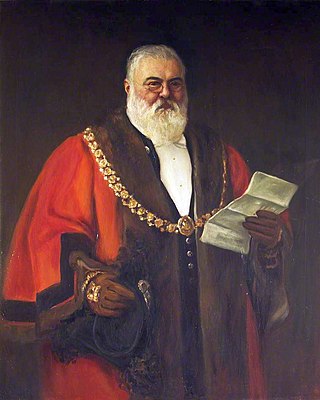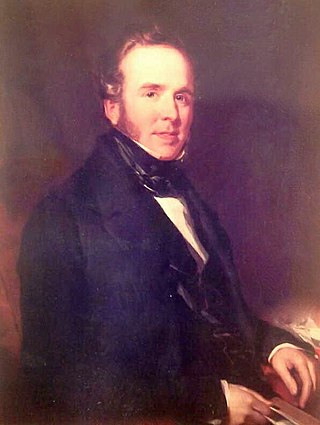Related Research Articles

The University of Bristol is a red brick Russell Group research university in Bristol, England. It received its royal charter in 1909, although it can trace its roots to a Merchant Venturers' school founded in 1595 and University College, Bristol, which had been in existence since 1876.

William Henry Wills, 1st Baron Winterstoke, known as Sir William Wills, Bt., between 1893 and 1906, was a British businessman, philanthropist and Liberal politician.

University College, Bristol was an educational institution which existed from 1876 to 1909. It was the predecessor institution to the University of Bristol, which gained a royal charter in 1909. During its time the college mainly served the middle classes of Bristol, and catered for young men who had entered a family business and needed a greater understanding of scientific topics.

Clevedon Court is a manor house on Court Hill in Clevedon, North Somerset, England, dating from the early 14th century. It is owned by the National Trust and is designated as a Grade I listed building.

Blagdon is a village and civil parish in the ceremonial county of Somerset, within the unitary authority of North Somerset, in England. It is located in the Mendip Hills, a recognised Area of Outstanding Natural Beauty. According to the 2011 census it has a population of 1,116. The village is about 12 miles (19 km) east of Weston-super-Mare on the A368 between Churchill and Compton Martin.

Stoke Bishop is a medium-sized outer city suburb in the north-west of Bristol, located in between Westbury-on-Trym, Sneyd Park, and Sea Mills. Although relatively low, Stoke Bishop's population has increased due to substantial infilling on the Smelting Works sports ground and The Grove which used to belong to Clifton High school. The population of Stoke Bishop varies throughout the year because of the influx of students to the large campus of Bristol University halls of residence situated on the edge of the suburb and the Downs during term time.

Henry Overton Wills III of Kelston Knoll, near Bath in Somerset, was a prominent and wealthy member of the Bristol tobacco manufacturing family of Wills which founded the firm of W. D. & H. O. Wills. As a philanthropist his best-known act was the funding of the University of Bristol, founded in 1909, of which he became the first Chancellor.

Sir Matthew White Ridley, 2nd Baronet, was a Northumbrian landowner and politician who sat in the House of Commons between 1768 and 1812.
Sir George Alfred Wills, 1st Baronet of Blagdon was a President of Imperial Tobacco and the head of an eminent Bristol family.

There have been four baronetcies created for members of the Wills family, owners of W. D. & H. O. Wills and major shareholders and directors of the Imperial Tobacco Company. All four creations were in the Baronetage of the United Kingdom.
Sir Ernest Salter Wills, 3rd Baronet of Hazelwood & Clapton in-Gordano, Laird of Meggernie Castle CStJ JP was Lord Lieutenant of Wiltshire from 1930 to 1942. He played tennis at Wimbledon in the early 1900s.
Sir John Gilmour, 4th Baronet DL was a British military officer who served in the Fife and Forfar Yeomanry/Scottish Horse. He was the son of Sir John Edward Gilmour of Lundin and Montrave, 3rd Bt. and Ursula Mabyn Wills.

Sir Abraham Elton, 2nd Baronet of Bristol and Clevedon Court, Somerset, was a British merchant, slave trader and Whig politician, who sat in the House of Commons for Taunton between 1724 and 1727, and then for Bristol from 1727 until his death in 1742. He also served as the High Sheriff of Bristol from 1710 to 1711, and was Mayor of Bristol for the year 1719 to 1720.
Sir Robert Cann, 1st Baronet, of Small Street, Bristol and Stoke Bishop, Westbury-on-Trym, Gloucestershire, was an English politician. He was Mayor of Bristol in 1662, a member of the Society of Merchant Venturers, and enlarged Trinity Theological College at Stoke Bishop. Cann campaigned for a law against kidnapping of white children for plantation work, but was himself fined in 1685 for taking criminals from Bristol to work on Bristol-owned Caribbean plantations.

The Anchor Society CIO is a Charitable Incorporated Organisation based in Bristol, England which supports older people in need in the Bristol and Bath region. Its work primarily centres around grants to individuals, housing and other projects which benefit older people.

Sir Frank William Wills of Berkeley Square, Bristol, England, was a member of the Wills tobacco family, who became a noted British architect and went on to serve as Lord Mayor of Bristol.

Henry Overton Wills II of Ashley House, in Bristol, England, was a tobacco merchant who in 1830 together with his elder brother William Day Wills co-founded W.D. & H.O. Wills, a company which by the late 1800s had become Britain's largest importer of tobacco and manufacturer of tobacco products.

William Day Wills of 2 Portland Square, Bristol, England, was a tobacco merchant who in 1830 together with his younger brother Henry Overton Wills II took over W.D. & H.O. Wills, a company which by the late 1800s had become Britain's largest importer of tobacco and manufacturer of tobacco products.

Henry Overton Wills I was a British merchant who founded the firm of W.D. & H.O. Wills in Bristol, England, which eventually became one of the largest tobacco companies in late 19th-century Britain, and later became the largest constituent part of Imperial Tobacco. The 1966 Guinness Book of Records named the Wills family, descended from him, as containing the largest number of millionaires in the British Isles, of which 14 left estates in excess of one million pounds since 1910, totalling 55 million, of which 27 million was paid in death duties. Wills is said to have been a non-smoker, despite the fact that he is regarded as one of the founders of the British tobacco industry.
Sir John Vernon Wills, 4th Baronet, KCVO, KStJ, TD, JP was an English landowner, businessman, farmer and royal representative.
References
- ↑ Rhodes, Michael (9 July 2018). "Peerage News: Diana, Lady Wills (1933-2018)". Peerage News. Archived from the original on 16 June 2020. Retrieved 16 June 2020.
- ↑ "Obituary: Sir John Wills Bt". The Independent. 12 September 1998. Archived from the original on 16 June 2020. Retrieved 16 June 2020.
- ↑ Media, Insider. "New venture for Sir David Wills". Insider Media Ltd. Archived from the original on 16 June 2020. Retrieved 15 June 2020.
- ↑ "COOMBE LODGE, Blagdon - 1129179 | Historic England". historicengland.org.uk. Archived from the original on 16 June 2020. Retrieved 15 June 2020.
- ↑ "The History of Coombe Lodge | Bristol". www.coombelodge.co.uk. Archived from the original on 16 June 2020. Retrieved 15 June 2020.
- ↑ "Ideal home". the Guardian. 18 December 2001. Archived from the original on 16 June 2020. Retrieved 15 June 2020.
- ↑ "Our Members". The Society of Merchant Venturers. Archived from the original on 10 June 2020. Retrieved 15 June 2020.